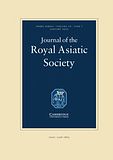Journal of the Royal Asiatic Society 2011 - 21,2
Verfasst von pw am Mo, 08/01/2011 - 19:13.
Journal of the Royal Asiatic Society
Journal of the Royal Asiatic Society / editor: Sarah Ansari [u.a.]. - Third Series. - Vol. 21. - Cambridge : Cambridge University Press, 2011
ISSN 1356-1863 (Printausgabe)
ISSN 1474-0591 (Online-Ausgabe)
Inhalt: 21,2 (2011)
Die Nummer 2 enthält folgende Beiträge mit Bezug zu Südasien:
KATE BRITTLEBANK: „Accessing the Unseen Realm: The Historical and Textual Contexts of Tipu Sultan's Dream Register“. - In: JRAS. - 3rd series, Vol. 21,2 (2011), S. 159-175
DOI: 10.1017/S1356186311000198
DOI: 10.1017/S1356186311000198
Abstract: Placing Tipu Sultan of Mysore's personal dream register in its textual and historical contexts reveals an internal logic to its structure and content that scholars have not previously recognised. An analysis of the manuscript as a whole suggests that it was compiled no earlier than 1795, as part of a range of strategies adopted by Tipu to ameliorate the position in which he found himself in the late 1790s. Isolated by his regional contemporaries and under increasing pressure from the British, he drew on a range of divinatory practices in an attempt to understand, and perhaps even influence, the outcome of events.
SANA HAROON: „Reformism and Orthodox Practice in Early Nineteenth-Century Muslim North India: Sayyid Ahmed Shaheed Reconsidered“. - In: JRAS. - 3rd series, Vol. 21,2 (2011), S. 177-198
DOI: 10.1017/S1356186311000174
DOI: 10.1017/S1356186311000174
Abstract: This paper is a reconsideration of the career of the north-Indian Sayyid Ahmed Shaheed (1786–1831). I argue that Sayyid Ahmed used a Sufi devotional premise to understand and explain principles of orthodoxy. He also applied a concept of innate spiritual knowledge to reformed practice, suggesting that ordinary people, without scholarly training, could determine and apply the principles of orthodox practice of Islam for themselves and for others. His movement modified traditional seminary-centred teaching and leadership through the creation of a popular and easily transferrable system of practice rooted in the community and imprinted with the obligation to spread reformist teachings.
Ähnlich
- Indo tetsugaku bukkyōgaku ronshū 2014 - 2
- JICPBS 18 (2014)
- Zeitschrift für Indologie und Südasienstudien 2013 -- 30
- ARIRIAB 17 (2013) Supplement
- ARIRIAB 17 (2013)
- MSS 2013 - Heft 67,1
- Berliner Indologische Studien 21 (2013)
- Bulletin d'études indiennes 2012 - No. 30
- Bulletin d'études indiennes 2010-2011 - No. 28-29
- Acta Tibetica et Buddhica 2013 - 6

